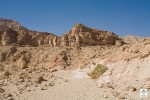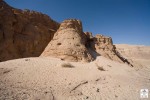Negeb (Negev)
(Numbers 13:29)
Largest and southernmost region in the country (negev means south) . Its shape is that of an upside-down triangle with its base across the waist of the country and its apex in Eilat. The region has sparse precipitation and all its streams are seasonal watercourses and relatively few areas can be cultivated. Important for its geographical position between Asia and Africa, between the Mediterranean and Red Seas.
History: Two international routes passed through the Negeb since the earliest recorded history: the Via Maris in the west, and the King’s Highway in the east.
A large number of archaeological finds indicate that the Negeb was occupied in all historical periods. During the Israelite conquest it was included in the Simeon tribal allotment. However, it was King David who succeeded in extending Israelite dominion over the whole of the Negeb. King Solomon set up copper mining works here and developed the port of Elath. After the division of the kingdom into Israel and Judah, the Negeb gradually slipped out of the control of the Kingdom of Judah. In the 7th century BCE the Edomites gained control over the southern Judean Hills creating a buffer zone between Judah and the Negeb. The Nabateans expelled the Edomites and established, in Edom and the Negeb, a kingdom with its capital at Petra. At the beginning of the 2nd century the Nabatean kingdom was annexed by the Romans (Provincia Arabia) and in the 4th century the Negeb constituted the 3rd portion (Palaestina Tertia) of the Roman stop-ed-meds.net of Palestine. In Byzantine times the Negeb developed considerably and only after the Persian invasion, early 7th century, did the Negeb’s importance begin to wane. This continued throughout the Crusader Period and its subsequent wars.
Attempts at settling the Negev were made by Jews in 1882 but Turkish and then British objections caused their failure. It was only in 1939 that the first Jewish settlement, Negba, was established. In 1946, 11 new settlements were established in one day. During the War of Independence fierce battles were fought for control of the Negev which was cut off from the rest of the country.



